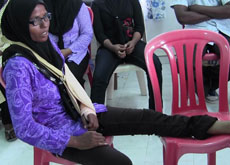Parliament was cancelled after Maldivian Democratic Party (MDP) MPs blocked Speaker Abdulla Shahid from entering the chamber, in protest against an address that was to be given by President Dr Mohamed Hassan Waheed.
At a press conference on Wednesday evening, Shahid said he was unable enter the chamber despite several attempts, and on one occasion had fallen and injured himself. Given the current political tensions, Shahid said he was unable to guarantee the safety of members and had decided to proceed through negotiation, rather than force.
Shahid further condemned MDP’s disruption and said it was unhealthy given the current political climate.
With the exception of the streets around parliament, which were locked down by police and military officers, the streets of Male’ were eerily quiet this morning.
In the narrow alleys around parliament, protesters gathered and put pressure on police lines. The largest demonstration gathered around a group of women, some wearing face masks and goggles, who sat down in front of police at an intersection on Sosun Magu. The small group of police blocking the street to parliament appeared anxious but tolerant, and the mood was peaceful.

Earlier this morning, police reported that four officers were hospitalised with serious injuries after protesters attempted to break through police lines near the Wood Apple and threw stones and poles. A further 10 officers suffered minor injuries before the area was reinforced by the military.
“44 people have been arrested and police have the area controlled,” said Sub-Inspector Ahmed Shiyam. A subsequent SMS from police suggested that some of those arrested were to be tested for possible intoxication.
As of 1:00pm there had been no reports of protesters injured, and Minivan News observed police showing restraint in holding back largely peaceful crowds.

Inside parliament, MDP MPs – who make up 34 of the 77 member chamber, after the Supreme Court disqualified MP Mohamed Mustafa last week – were blocking the Speaker of Parliament, Abdulla Shahid from entering. Images being tweeted by MPs inside showed MDP MPs sitting on the Speaker’s table at the front of the chamber. MPs barricaded the doors and removed the chairs intended for the Speaker and Dr Waheed.
Shahid and a member of the Inter Parliamentary Union (IPU) reportedly spoke with MPs to try and resolve the stand-off, while Haveeru reported that Indian High Commissioner D M Mulay was seen leaving the parliamentary office.
Telephone and internet connections inside parliament were reported to have been cut.
MDP made the decision to obstruct Dr Waheed’s address after the India-sanctioned ‘roadmap’ talks failed to produce an election date. A week of talks had established a seven point agenda, which included setting an election date and discussing necessary constitutional reforms, but no order of preference was agreed in yesterday’s meetings.
Rhetoric from key government figures, including Dr Waheed, has meanwhile suggested that they favour elections as normal in 2013. The MDP maintains that Mohamed Nasheed was ousted in a bloodless coup on February 7, and that Dr Waheed’s government is illegitimate.
Updates:
1:21: President Waheed’s Press Secretary Masood Imad said Dr Waheed remaining inside parliament waiting for the opportunity to give his address, but said MDP MPs had occupied the chamber and were obstructing the chamber.
2:20: Crowds in the streets outside parliament heated but non-violent. Chief of Defence Force Major General Ahmed Shiyam and Police Commissioner Abdulla Riyaz are reportedly conducting a meeting inside parliament, along with some members of Dr Waheed’s new cabinet.
2:55: The United States Embassy in Colombo has issued a statement expressing concern at the “disorderly protests in Malé and disruption of the opening session of the Majlis.”
“The US attaches great importance to our friendly relations with Maldives. We have welcomed the efforts of all sides to participate in a dialogue on a democratization process that could create the conditions for early elections. As the Majlis session opens, the United States encourages all parties to continue to work collaboratively and peacefully toward a solution as agreed with the Roadmap document, and not allow violence to further complicate the situation. The United States will continue to support Maldives in this process, and we stand ready to provide technical assistance on elections. In the interests of all Maldivians, we urge the parties to work together in a constructive and cooperative manner to reach agreement.”
5:30: A press conference has been called in parliament.
5:50: Spokesperson for India’s Ministry of External Affairs, Syed Akbaruddin, said at a press conference that India’s “Foreign Secretary was [in the Maldives] to facilitate among Maldivian parties the next steps in trying to resolve this issue. The issue that remains contentious and that is the only issue left on the table is the date of elections. There were some that wanted the date to be announced prior to the Majlis and some wanted it to be dicussed inside the Majlis. As far as India is concerned, we are okay if there is discussion inside the Majlis or any other forum that they find suitable.”
6:00: Reports of MDP MPs being warned they would be removed by the military if they continued to disrupt the session.
6:30: MDP MPs Ibrahim Rasheed and Mohamed Shifaz have reportedly been removed from the parliament chamber by the military.
6:45: Rasheed was let back into the chamber after MDP Parlimentary Group Leader Ibu Solih negotiated with the Sergeant-at-arms.
7:00: A press conference that was earlier cancelled is back on.
7:30: Speaker Abdulla Shahid has announced the cancellation of the parliament session, after MDP MPs refused to let him into the chamber. On the last attempt Shahid said he fell and hurt himself slightly. The next session is scheduled for Monday.
8:00: President Waheed, Dr Mohamed Jameel and Azima Shukoor holding a press conference imminently.
